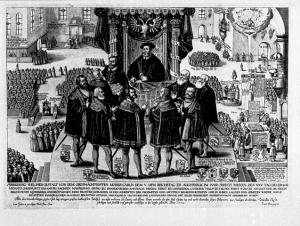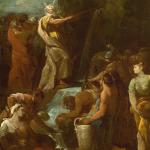François Turretin (1623-1687) was a Genevan-Italian Reformed scholastic theologian and renowned defender of the Calvinistic (Reformed) orthodoxy represented by the Synod of Dort, and was one of the authors of the Helvetic Consensus (1675). He is generally considered to be the best Calvinist apologist besides John Calvin himself. His Institutes of Elenctic Theology (three volumes, Geneva, 1679–1685) used the scholastic method. “Elenctic” means “refuting an argument by proving the falsehood of its conclusion.” Turretin contended against the conflicting Christian perspectives of Catholicism and Arminianism. It was a popular textbook; notably at Princeton Theological Seminary, until it was replaced by Charles Hodge‘s Systematic Theology in the late 19th century. Turretin also greatly influenced the Puritans.
This is a reply to a portion of Institutes of Elenctic Theology (Vol. 2, 18th Topic: The Church; XI. The Infallibility of the Church). I utilize the edition translated by George Musgrave Giger and edited by James T. Dennison, Jr. (Presbyterian and Reformed Publishing Company, Phillipsburg, New Jersey: 1992 / 1994 / 1997; 2320 pages). It uses the KJV for Bible verses. I will use RSV unless otherwise indicated. All installments of this series of replies can be found on my Calvinism & General Protestantism web page, under the category, “Replies to Francois Turretin (1632-1687).” Turretin’s words will be in blue.
*****
It is evident that the church often erred under the Old Testament. The Israelite church erred when Aaron made the golden calf and built an altar before it (Ex. 32:2, 5). Now it makes little difference whether this was done by the well-ordered judgment of the church or by a tumultuary concourse of people, provided it appears that the rulers of the church themselves with the people fell into such a sin. Nor does it relieve the matter whether for a long time or for a little while they remained in that sin. It is sufficient that such a crime was committed in order to prove that the church was not infallible. And although Aaron had not as yet been consecrated a priest in solemn manner, still that he had been already designated and determined upon by God and acknowledged by the people is evident even from the fact that the priests are ordered to sanctify themselves (Ex. 19:22) and that the people came to him to make the calf (which they would not have done unless they now regarded him as a priest).
Turretin goes on at great length chronicling sins of the Israelites as recorded in the Old Testament. I have dealt with this question: Dialogue with a Lutheran on Ecclesiology & OT Indefectibility Analogies (vs. Nathan Rinne) [11-22-11]. I wrote in this dialogue (presently condensed):
The Old Testament proto-Church did not have the Holy Spirit and express promises from God that it would be protected and never defect. The Holy Spirit was only given to select individuals in the old covenant: but now to every baptized Christian and in greater measure to Church leaders. There are promises of indefectibility, too, that go even further than what was present in kernel form in the old covenant.
What remains constant in the old covenant is God’s mercy towards his always-straying children, and holding to His covenants despite their rebelliousness. Hence we have the notion of remnant. But that is distinct from institutional indefectibility (that is also present in the old covenant, though less dramatically than in the new).
The new covenant is quite far beyond the old, and Catholicism is the fullness of the development of a Church and the new covenant and Christian post-pentecostal age (developed from the previous old covenant system). The new covenant “new wineskins” are far more advanced.
If the institution of religious leadership even in the old covenant was indefectible, so that there was never a time that Israel lacked true, obedient leaders altogether, how much more so should we expect this to be the case in the new covenant? Nehemiah 1:9 shows that God’s presence is directly dependent on obedience: “if you return to me and keep my commandments . . .” (cf. Lev 26:3-4). Therefore it is not unconditional as the new covenant indefectibility of the Church is.
But this is not the case in the new covenant and Church Age. The promises are unconditional. God will do what He promises regarding protection of the Church and her doctrine: “the powers of death shall not prevail against” the Church (Matt 16:18); period. It’s not based on obedience. God brings it to pass. End of story. “I am with you always, to the close of the age” (Matt 28:20); no conditions again. It’s an absolute statement. God wills and declares and promises it, so it will happen, and cannot not happen.
Peter falters and denies Christ three times, but after he is filled with the Holy Spirit it is a different story. Jesus prays for him in a special way because he is the leader of the Church: “I have prayed for you that your faith may not fail” (Lk 22:32); and indeed it doesn’t, after Pentecost. This is a type and shadow of papal infallibility, as is being given the keys of the kingdom (Matt 16:19): only given to Peter; and all the implications of that (rightly understood, in light of its OT precursors). God Himself protects the doctrine of the Church from being corrupted. This is the entire point. If it were left up to men, this wouldn’t happen, but when God wants something done (in this case, preservation of true doctrine and theology and moral teaching), it is done.
The prophets are the most analogous to the infallibility of popes, as I have argued in my book against sola Scriptura. But they were not part of the religious system; they were outside of it: usually rebuking the corrupt people in it. The difference in the new covenant is that God promises to protect the institutional system of the Church from error (“it has seemed good to the Holy Spirit and to us” — Acts 15:28: the Jerusalem Council). The Church is a far more spiritually advanced entity.
Here are the biblical arguments from St. Francis de Sales’ book, The Catholic Controversy, that caused me to revise my position on the indefectibility of the old covenant institutional religious system (passages: RSV; all comments are his own, except for a few of my bracketed interjections):
Exodus 32:26 then Moses stood in the gate of the camp, and said, “Who is on the LORD’s side? Come to me.” And all the sons of Levi gathered themselves together to him.
Did not Aaron the High Priest adore the golden calf with all his people? [Protestant argument for complete defectibility] Answer: Aaron was not as yet High Priest, nor head of the people, but became so afterwards. And it is not true that all the people worshipped idols: — for were not the children of Levi men of God, who joined themselves to Moses? (pp. 60-61)
2 Chronicles 15:3 For a long time Israel was without the true God, and without a teaching priest, and without law;
Elijah lamented that he was alone in Israel (1 Ki 19:14) [“I, even I only, am left”]. Answer: Elijah was not the only good man in Israel, for there were seven thousand men who had not given themselves up to idolatry [1 Ki 19:18: “I will leave seven thousand in Israel, all the knees that have not bowed to Ba’al”], and what the Prophet says here is only to express better the justice of his complaint. It is not true again that if all Israel had failed, the Church would have thereby ceased to exist, for Israel was not the whole Church. Indeed it was already separated therefrom by the schism of Jeroboam; and the kingdom of Judah was the better and principal part; and it is Israel, not Judah, of which Azarias predicted that it should be without priest and sacrifice. (p. 61)
Isaiah 1:4-6 Ah, sinful nation, a people laden with iniquity, offspring of evildoers, sons who deal corruptly! They have forsaken the LORD, they have despised the Holy One of Israel, they are utterly estranged. [5] Why will you still be smitten, that you continue to rebel? The whole head is sick, and the whole heart faint. [6] From the sole of the foot even to the head, there is no soundness in it, . . .
. . . these are forms of speaking, and of vehemently detesting the vice of a people. And although the Prophets, pastors and preachers use these general modes of expression, we are not to understand them of each particular person, but only of a large proportion; as appears by the example of Elijah who complained that he was alone, notwithstanding that there were yet seven thousand faithful. [1 Ki 19:14, 18] S. Paul complains to the Philippians (2:21) that all seek their own interest and advantage; still at the end of the Epistle he acknowledges that there were many good people with him and with them. [4:10, 14-18] (p. 61)
If the fall of the synagogue was predicted, so also was the fall of the Christian church. If it could happen that while Christ was living and speaking on earth, the church so disgracefully erred, what hinders this also from being the case today, Christ being now absent and received into heaven and speaking only in the Scriptures?
1 Timothy 3:15 (“the church of the living God, the pillar and bulwark of the truth”) does. The example of the Jerusalem Council (Acts 15), led by Peter the first pope, and it’s proclamation, agreed-to by the Holy Spirit, promulgated by St. Paul throughout Turkey (Acts 16:4) also does; and of course Matthew 16:18, where Jesus proclaims, “you are Peter, and on this rock I will build my church, and the powers of death shall not prevail against it.” If we want to go by the Bible, one of its teachings is the infallibility and indefectibility of the Church and the pope who leads it. We can’t simply pick-and-choose from the inspired, inerrant revelation of Holy Scripture what we prefer and what we arbitrarily want to ignore.
From the various predictions, from which it is evident that the church of the New Testament should err. In 2 Thess. 2, Paul (speaking of
the apostasy of the last days) says, “The day of the Lord shall not come, except there come a falling away first, and that man of sin be revealed, the son of perdition; who opposeth and exalteth himself above all that is called God, or that is worshipped; so that he, as God, sitteth in the temple of God, shewing himself that he is God” (vv. 3, 4).
I’ve already dealt with this in my past treatment in this series of “sinners in the Church.” The antichrist is obviously merely an anti-pope, and as such carries no force against papal infallibility, which refers to true popes, not merely false ones wo claim to be so.
Now if such and so great an apostasy was to have place in the church, who would say that the gift of infallibility belongs to it?
But it’s not “in the church”; this is my argument. It’s wolves in sheep’s clothing.
as often as the Scripture of the New Testament uses the word apostasias or the verb aphistēmi, it denotes a defection from the faith (Acts 21:21; 1 Tim. 4:1).
Indeed. Individuals have committed apostasy, or never were Christians. Acts 21:21 refers to false charges against Paul, that he supposedly wanted “all the Jews who are among the Gentiles to forsake Moses.” That has nothing to do with the alleged fall of the entire Christian Church. Nor does 1 Timothy 4:1, which merely states that “some will depart from the faith”. So what? That says northing about an entire Church. Church doctrine is not affected by things like this. It is what it is:
1 John 2:19 They went out from us, but they were not of us; for if they had been of us, they would have continued with us; but they went out, that it might be plain that they all are not of us.
Mention is made of “an apostasy” which was to come (namely from faith) by “the man of sin and the son of perdition,” i.e., a remarkable apostate who should be the author of this so great defection, . . .
Hence it is evident that this apostasy can refer to nothing else than the general defection which should arise in the Christian church by the advent of Antichrist. . . .
Since from all these it appears that deadly errors were to have a place in the church, everyone sees that infallibility cannot be predicated truly of her.
The texts that Turretin claims prove a supposed “general defection” do not in fact do so.
2 Thessalonians 2:3-4 . . . that day will not come, unless the rebellion comes first, and the man of lawlessness is revealed, the son of perdition, [4] who opposes and exalts himself against every so-called god or object of worship, so that he takes his seat in the temple of God, proclaiming himself to be God.
Nothing general there; this is merely referring to one usurper. He’s obviously, manifestly not a Christian at all, since He claims falsely to be God. And who are the ones that Paul says are taken in by this? It’s the ones who are damned; who refused to accept the truth. It obviously couldn’t be every professed Christian, or the entire Church, lest everyone be lost!:
2 Thessalonians 2:9-12 The coming of the lawless one by the activity of Satan will be with all power and with pretended signs and wonders, [10] and with all wicked deception for those who are to perish, because they refused to love the truth and so be saved. [11] Therefore God sends upon them a strong delusion, to make them believe what is false, [12] so that all may be condemned who did not believe the truth but had pleasure in unrighteousness.
He cites the following passage, thinking it’s a prooftext for his view:
Matthew 24:24 For false Christs and false prophets will arise and show great signs and wonders, so as to lead astray, if possible, even the elect.
But the reply to his misuse of it is right in the text: the elect cannot be led astray (it’s not possible) by virtue of the fact that they are the elect (and as such cannot not be saved). Therefore, the entire Church can’t fall away. Likewise, Acts 20:28-30 talks about some folks being led astray, but by no means all. So it proves nothing for his case.
Note especially the book of Revelation, where the great Babylonian harlot and the mother of fornications is said to intoxicate the kings of the earth and the inhabitants of the world with the wine of fornication (i.e., idolatry, chaps. 17 and 18). On this account, God calls his people out from her, lest sharing in her sins they may also partake of her destruction.
This is beyond silly. Turretin assumes that all of this material about Babylon in Revelation 17 and 18 is somehow describing the Church. But the word “church” never appears in the two chapters. The Church is never called “Babylon” in Holy Scripture. The very notion is absurd. God’s people here are being called out of the world-system, that rebels against God. As I wrote about before, early in the book of Revelation, when Jesus rebukes six of the seven churches, He still uses the words “church” and “churches” to describe them. He never denies that they are parts of the true Church (like Turretin does) because sin can be found in them.
Thus we see no “general defection” here. The “rebellion” that Turretin takes to be the apostasy of the entire Church, is merely that of the reprobate, according to Paul. It’s a presupposed false notion and false “tradition of men” that Turretin superimposes onto the biblical text (eisegesis). It’s simply not there.
*
***
*
Practical Matters: Perhaps some of my 4,500+ free online articles (the most comprehensive “one-stop” Catholic apologetics site) or fifty-five books have helped you (by God’s grace) to decide to become Catholic or to return to the Church, or better understand some doctrines and why we believe them.
Or you may believe my work is worthy to support for the purpose of apologetics and evangelism in general. If so, please seriously consider a much-needed financial contribution. I’m always in need of more funds: especially monthly support. “The laborer is worthy of his wages” (1 Tim 5:18, NKJV). 1 December 2021 was my 20th anniversary as a full-time Catholic apologist, and February 2022 marked the 25th anniversary of my blog.
PayPal donations are the easiest: just send to my email address: [email protected]. Here’s also a second page to get to PayPal. You’ll see the term “Catholic Used Book Service”, which is my old side-business. To learn about the different methods of contributing (including Zelle), see my page: About Catholic Apologist Dave Armstrong / Donation Information. Thanks a million from the bottom of my heart!
*
***
Photo credit: [Lutheran] Augsburg Confession: session of 25 June 1530 (1630), by Johann Dürr (1600-1663) [public domain / Wikimedia Commons]
Summary: As part of my series of replies to Calvinist Francois Turretin, I provide the biblical basis for the indefectibility of the [Catholic] Church, and address objections.














